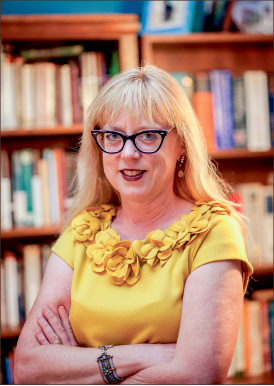Who is Hannah More?
That is the question Dr. Karen Swallow Prior, prolific writer and English professor at Liberty University, sought to answer in her new book, “Fierce Convictions: The Extraordinary Life of Hannah More: Poet, Reformer, Abolitionist.”
In the more than 200 years since the end of the British slave trade, William Wilberforce’s name has become synonymous with the abolition movement — and for good reason. But what about the people behind Wilberforce? What — and who — was it that made abolition possible?
In the book, Prior answers those questions in an engaging way. It was when she was searching for a topic for her doctoral dissertation that the English professor stumbled upon More and immediately knew she had found her topic.
“I had never heard of her, (but) as soon as I read about her, … I knew she was the one that I needed to write about,” Prior said. “I always had in mind that I wanted to write a popular biography of her, and so, 15 years later, here it is.”
More was a member of the “Clapham Sect,” a group of inspired evangelicals, of which Wilberforce was a part. The group was dedicated to social reformation — abolition being chief among their causes.
As the title suggests, More was a Renaissance woman. In her role as poet, reformer and abolitionist, More played her part as a teacher, a playwright, an activist and so much more. In all of her roles, she sought to eradicate the society of the damaging norms with which she grew up, never allowing cultural influence to water down her convictions.
“Of course, her role was less public because she was a woman,” Prior said of why More is not as well-known today. “She was very well-known in her day, so I think her peers would have been surprised to learn that she (was) sort of forgotten in history.”
Previously known only to a small collection of historians and scholars, Prior puts More center stage, and, with the praise of several leading voices within the Evangelical movement, I think she is here to stay.
“As someone who is a committed, conservative evangelical with strong convictions about theology and doctrine and cultural issues, I see in Hannah More an example of a person who can hold those convictions and who can reach across various cultural and theological divides,” Prior said. “But I also see someone who had weaknesses. … So to me, she is a human, fallible, yet exemplary, figure … I want to emulate the strengths that she showed, the victories that she had in bridging divides.”
In today’s Evangelical society, we have moved backward from the place More was so many years ago. In More’s day, her theology cast a wide net, holding fast to convictions on animal welfare, poverty, slavery and education, differing from today’s activist culture in which we often cast a very narrow net, focusing on one particular issue, remaining blind to the implications of our limited interests.
“(More and her fellow evangelicals) were not single-issue Christians,” Prior said. “There were so many issues facing them in their time, and they championed so many causes with the same passion and fervor that many of us champion single causes. That’s something that we in the conservative evangelical pocket of society can learn from.”
More was passionate about the necessity that all people have access to society and education. Hand-in-hand with her convictions against slavery, she held deep convictions for gender equality, too.
Prior, excited about the timely release of the book, described the current Evangelical climate as “ripe” for change in perspective. There are many great examples of leaders within Christianity.
However, very few of them are women. Prior described More as someone who most likely held very conservative views of gender roles — more conservative than most today — yet was still an effective leader, using her “God-given gifts fully to his glory.”
The book has garnered the endorsements of several leading men and women within Christendom who represent a wide spectrum of beliefs on women’s roles in the Church. Prior credits Hannah More as being a catalyst for bridging some of those divides.
During the writing process, Prior journeyed to Bristol, England, More’s homeland, and described streets, schools, nursing homes and the cottage where she taught Sunday school that are now named after the abolitionist. With the release of “Fierce Convictions,” Prior wants to stretch More’s legacy past those schools and streets in Bristol, bringing her to the crossroads of Christianity, in hopes of igniting a renewed unity within Evangelical society.
“I hope that people find a very human, but admirable example of a woman who was able to overcome a number of limitations and social and cultural challenges and make a huge difference in her world,” Prior said of her hopes for the book. “We are all in that place. We are all in a certain culture, in a certain time, with challenges, with limitations, and yet God gives us gifts and opportunities to overcome them, and I think (More is) a great example of that.”
In the spirit of More, I encourage everyone to pick up a copy of “Fierce Convictions,” ready to be challenged and inspired by the life and works of one of the world’s most extraordinary poets, reformers and abolitionists.

